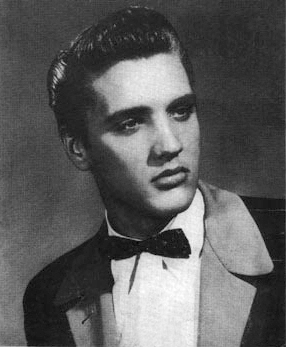November 8, 2016
Childhood of the King of Rock n’ Roll: Elvis Presley, Part I

Everyone has a favorite musician, and they could probably name their favorite songs, the places and dates of when they saw them, but if asked, would they be able to talk about their favorite artist before they were famous? Could they discuss their favorite musician’s childhood, such as where they were from, when they first became interested in music, and if they were even good in the beginning?

Before he would be known as the King of Rock n’ Roll, Elvis Presley led a simple life. His mother, Gladys Presley, was carrying twins, Jesse Garon and Elvis Aron; both were delivered on January 8, 1935; Jesse Garon would be pronounced as a stillborn.1 Although Elvis did not have a chance to actually meet his brother, he would grow up visiting his brother’s grave; he would always refer to Jesse as his twin.2 Gladys believed that even though Jesse Garon did not survive, Elvis would always carry his brother with him. Gladys believed that Elvis carried the strength of both babies, but without Jesse Garon, Elvis always felt he was missing half of himself.3 People that lived around them noticed that Elvis seemed unusually close to his mother.4 Gladys, only having one child, hovered over Elvis as he was growing up; because of that, Elvis would always be by his mother’s side.
It was very hard for the family to lose Jesse Garon at birth, but they made the best of it, and loved Elvis fiercely. Elvis’s father, Vernon, and his mother loved him very much and wanted to protect him from everything, but showed restraint in allowing him be his own person. After losing Jesse, the family was heartbroken, but leaned on one another for strength. They knew that family would always be there for them if they needed help and the Presleys kept their little family of three close. With the tragedy of knowing that someone was missing in their family, Elvis made sure that he was there for the both of them, always promising that he would do whatever he could for his parents.
Elvis started going to school, and although he was not the brightest student, he did his best in his classes and followed the rules. He was always on his best behavior when at school, and was polite to those around him. Elvis was shy and tried to get along with his classmates, trying out for football and ROTC, getting out of his shell.5 Elvis was not good with attention on him in his early life; he was a loner. He was always alone, and found himself more at ease being around teachers than his fellow classmates.6

Elvis started showing interest in music at a young age, but only truly did something with music when he was older. When he was two, Elvis attended a church sermon with his mother and upon hearing the choir sing Shake Rag, a rhythm-and-blues song; he ran from her lap to join the choir.7
His love for music was instinctual; he drank it in, allowing it to flow through his veins like a drug; he had a channel stuck in his head hooked up to the divine gods of music.8
He was passionate even at a young age and to be this passionate, he knew what he wanted to do with his life. The sounds he would hear around him affected him to make his sound, to find what he did or did not like.
Elvis soaked up all the musical sounds around him, the train whistle, the white country singers, the poplar sound on the radio, the jamboree performers at the courthouse, the gospel music at his church, the flux of sounds in Shake Rag, the gospel at the African American churches and the tent revivals.9
Wherever he went, he always found a sound that intrigued him. The hold music had on him would prove to be the most powerful bond he had ever felt in his life.
- Peter Guralnick, Last Train to Memphis: The Rise of Elvis Presley (Little, Brown & Company, 1994), 13. ↵
- Guralnick, Last Train to Memphis: The Rise of Elvis Presley, 13. ↵
- Bobbie Ann Mason, Elvis Presley (A Lipper/ Viking Book, 2003), 11. ↵
- Guralnick, Last Train to Memphis: The Rise of Elvis Presley, 13. ↵
- Glen Jeansonne, David Luhrssen, and Dan Sokolovic, Elvis Presley, Reluctant Rebel: His Life and Our Times (Praeger, 2011), 22. ↵
- Guralnick, Last Train to Memphis: The Rise of Elvis Presley, 35. ↵
- Mason, Elvis Presley, 16. ↵
- Mason, Elvis Presley, 16. ↵
- Mason, Elvis Presley, 17. ↵
Tags from the story
Elvis Presley